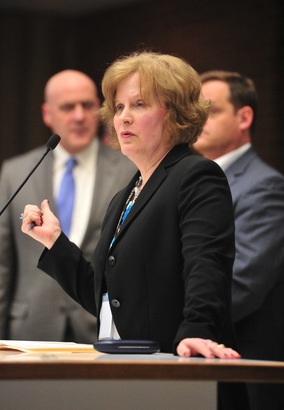Ann Arbor's 15th District Court isn't just a place where law breakers go to get sentenced for crimes they committed. It's often a place where people get real help.
"We do not just process cases," said Chief Judge Elizabeth Hines. "We actually try to address the underlying issues that bring people to court before us — such as mental health, addiction, substance abuse, PTSD, domestic violence and homelessness."
Hines and the two other judges with whom she shares the 15th District Court bench — Chris Easthope and Joe Burke — appeared before the Ann Arbor City Council during a special work session Monday night to give an update on how different court programs are working.
Hines, who helped create the local Street Outreach Court for the homeless, presides over criminal and civil cases in Ann Arbor, including a specialized domestic violence docket.

Chief Judge Elizabeth Hines and fellow 15th District Court judges Joe Burke and Chris Easthope appear before the Ann Arbor City Council Monday night.
Ryan J. Stanton | AnnArbor.com
Easthope talked about the early success he's seeing with a new Veterans Treatment Court, which he presides over each Wednesday. Hines called it Ann Arbor's newest problem-solving court.
"We're almost up to 20 veterans and we just started in November," Easthope said, adding it's generally an 18-month program geared toward getting veterans the help they need.
"We are the fourth court in Michigan now to start this," he said. "It allows treatment of the veterans in coordination with the VA Hospital. It's a very great program. It involves mental health treatment, substance abuse treatment, housing and life skills, and we combine them all into one."
Of the roughly 20 veterans to enter the program so far, Easthope said, only two have had to serve any jail time, while the rest have been placed on a different path.
"We were just fortunate enough to get two homeless veterans housing vouchers, and they recently moved into housing here locally," he said. "And it's so far, so good."
Easthope said the new Veterans Treatment Court was inspired by one started in 2008 in Buffalo, N.Y., and he expects the program to grow quite large.
"With all the wars that we've had, we've had a lot of soldiers returning back home, and this is really a post-Vietnam type of era," Easthope said, describing the court as a way to recognize veterans for their service and make sure they're not lost in the shuffle of the criminal justice system.
"It doesn't mean we're giving them breaks," he said. "But it's to recognize that something about their service may have caused them to go astray of the law."
The judges Monday night relayed the findings of a new report from the State Court Administrative Office, which compared 2007 and 2011 case filings in 15th District Court.
It showed misdemeanors were down 31 percent at 3,109, civil infractions were down 49 percent at 13,894, and general civil cases were down 16 percent at 1,742. The report doesn't show felonies for Ann Arbor, but Hines said there were 933 hearings related to felony cases last year.
"We're a really busy court," Hines said. "We have no backlog."
The report also looked at recidivism rates for those admitted into Ann Arbor's Sobriety Court, showing 6.7 percent had a new alcohol or drug conviction within two years — compared to 2.8 percent statewide and 10 percent among courts of similar size and structure.
Burke, who was appointed to the bench last year and now oversees the Sobriety Court, said the reason why Ann Arbor's recidivism rate is worse than the statewide rate is because the Sobriety Court here is more of a hybrid model — it deals with both alcohol and heavier drugs.
"Sobriety court would allow only people charged with drunk driving in it. In our court, we will allow drug offenders if they're nonviolent and if it's a misdemeanor," Burke said.
"Just this past Friday, we graduated a heroin user," he added. "A 50-year-old heroin user. A guy who's been using for 20-some years. He's been clean for two, wants to stay clean. It was pretty incredible because that's a hard thing to do, and that's why our numbers are a little bit higher."
Hines said the Street Outreach Court is continuing to make a difference in the lives of homeless offenders who enter the criminal justice system in Ann Arbor.
"In this program, it's this incredible, collaborative approach where if a person works with an agency, and they're really working hard, they can create an action plan, and I can give them credit for what they've done," Hines said. "They might do weeks or months of mental health treatment or substance abuse treatment or whatever, and they leave the court with a clean slate and a fresh start."
Ryan J. Stanton covers government and politics for AnnArbor.com. Reach him at ryanstanton@annarbor.com or 734-623-2529. You also can follow him on Twitter or subscribe to AnnArbor.com's email newsletters.